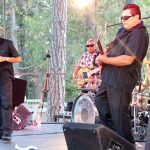A panel of state court appellate judges overturned a Riverside Superior Court decision to grant a new trial to Christopher V. Hillman, who was convicted of seven counts of attempting to influence the jury during the Raymond Oyler arson murder trial the previous year.
Hillman is Oyler’s brother-in-law.
Within a month of Hillman’s conviction in July 2010, trial Judge Larrie Brainard had concerns about the adequacy of Hillman’s defense.
On Wednesday, a three-judge panel overturned Judge Brainard’s decision to grant Hillman a new trial. No new sentencing hearing has been scheduled yet, in case Hillman appeals this decision.
“[Hillman] did not carry his burden of proving incompetency of retained counsel that prejudiced him such that reversal of his conviction was appropriate,” the panel reluctantly concluded.
In response to the appellate decision, John Hall, senior public information specialist for the Riverside County District Attorney’s Office, said, “A jury found defendant Hillman guilty beyond a reasonable doubt of jury tampering. There was not a sufficient basis for the court to grant a new trial and the state court of appeals agrees with our office about that.”
Throughout their opinion, the panel discussed several points or opportunities where Hillman’s counsel might have performed better, but ultimately they recognized that it was his decision not to testify at his trial and afterward he never complained about his retained attorney’s performance.
Further, the panel’s opinion noted that Hillman’s appointed attorney for the appeal never relied on Judge Brainard’ basis for concluding that the original attorney did not adequately represent him.
At the August 2010 sentencing hearing following Hillman’s conviction, Judge Brainard stated Hillman should have a new counsel to investigate whether a new trial motion should be brought. The judge questioned Hillman’s defense during the trial and stated that a new trial may be in his best interest.
During the fall of 2010, several sentencing hearings were postponed. Then at a Dec. 6 hearing, Judge Brainard decided the defendant was not appropriately represented and was not sure if justice was done on this case.










